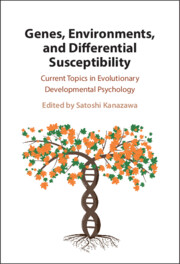 Genes, Environments, and Differential Susceptibility
Genes, Environments, and Differential Susceptibility Book contents
- Genes, Environments, and Differential Susceptibility
- Genes, Environments, and Differential Susceptibility
- Copyright page
- Contents
- Figures
- Tables
- Contributors
- Introduction
- Part I Historical Background and Theoretical Foundations of Jay Belsky’s Work in Evolutionary Developmental Psychology
- Part II Parent–Child Relations and Attachment
- Part III Life-Course Development from Prenatal Environment through Childhood to Adulthood
- Chapter 7 Teacher–Student Relationships Are a Developmental Context
- Chapter 8 The Childhood Roots of Vaccine Hesitance and Resistance
- Part IV Differential Susceptibility to Environmental Influences
- Conclusion
- Afterword
- Biography of Jay Belsky
- Index
- References
Chapter 8 - The Childhood Roots of Vaccine Hesitance and Resistance
A Five-Decade Cohort Study
from Part III - Life-Course Development from Prenatal Environment through Childhood to Adulthood
Published online by Cambridge University Press: 04 September 2025
- Genes, Environments, and Differential Susceptibility
- Genes, Environments, and Differential Susceptibility
- Copyright page
- Contents
- Figures
- Tables
- Contributors
- Introduction
- Part I Historical Background and Theoretical Foundations of Jay Belsky’s Work in Evolutionary Developmental Psychology
- Part II Parent–Child Relations and Attachment
- Part III Life-Course Development from Prenatal Environment through Childhood to Adulthood
- Chapter 7 Teacher–Student Relationships Are a Developmental Context
- Chapter 8 The Childhood Roots of Vaccine Hesitance and Resistance
- Part IV Differential Susceptibility to Environmental Influences
- Conclusion
- Afterword
- Biography of Jay Belsky
- Index
- References
Summary
Jay Belsky’s career has always focused on important social and behavioral challenges, and Jay specialized in showing how childhood experience shapes people’s behavior in the face of such challenges. Here we describe a project that could have been done by Jay himself, and that drew on ideas shared with us by Jay over the years of our friendship. The social problem we studied emerged from the 2020–21 COVID-19 pandemic: resistance to the vaccines. We carried out the project in the five-decade Dunedin Study, where we compared groups who differed in their intentions toward the COVID-19 vaccine in the weeks before vaccines became available. We found that vaccine-resistant and vaccine-hesitant cohort members had histories of adverse childhood experiences that fostered mistrust of authority, early-life mental-health problems that fostered misinterpretation of health messages, and early-life personality styles including tendencies to have extreme negative emotions, shut down mentally under stress, to value being a nonconformist, and to be fatalistic about health. Making matters worse, many Vaccine-Resistant and Vaccine-Hesitant participants also had difficulty cognitively comprehending health information. We found that negative vaccine intentions are not short-term misunderstandings that can be readily cleared up by delivering more information to adults in the midst of a public-health crisis. Instead they are part of a person’s lifelong psychological style of misinterpreting information and making unhealthy decisions during stressful uncertain situations. The key contribution from our study is the appreciation that this style is laid down well before secondary school age. To prepare for pandemics of the future, education about viruses and vaccines in schools could reduce citizens’ level of uncertainty and fear during a pandemic and give people preexisting knowledge that prevents shutdown under emotional distress and enhances their capacity to hear health messages.
Information
- Type
- Chapter
- Information
- Genes, Environments, and Differential SusceptibilityCurrent Topics in Evolutionary Developmental Psychology, pp. 176 - 192Publisher: Cambridge University PressPrint publication year: 2025
References
Accessibility standard: WCAG 2.0 A
Why this information is here
This section outlines the accessibility features of this content - including support for screen readers, full keyboard navigation and high-contrast display options. This may not be relevant for you.Accessibility Information
Content Navigation
Allows you to navigate directly to chapters, sections, or non‐text items through a linked table of contents, reducing the need for extensive scrolling.
Provides an interactive index, letting you go straight to where a term or subject appears in the text without manual searching.
Reading Order & Textual Equivalents
You will encounter all content (including footnotes, captions, etc.) in a clear, sequential flow, making it easier to follow with assistive tools like screen readers.
You get concise descriptions (for images, charts, or media clips), ensuring you do not miss crucial information when visual or audio elements are not accessible.
You get more than just short alt text: you have comprehensive text equivalents, transcripts, captions, or audio descriptions for substantial non‐text content, which is especially helpful for complex visuals or multimedia.
Visual Accessibility
You will still understand key ideas or prompts without relying solely on colour, which is especially helpful if you have colour vision deficiencies.
You benefit from high‐contrast text, which improves legibility if you have low vision or if you are reading in less‐than‐ideal lighting conditions.